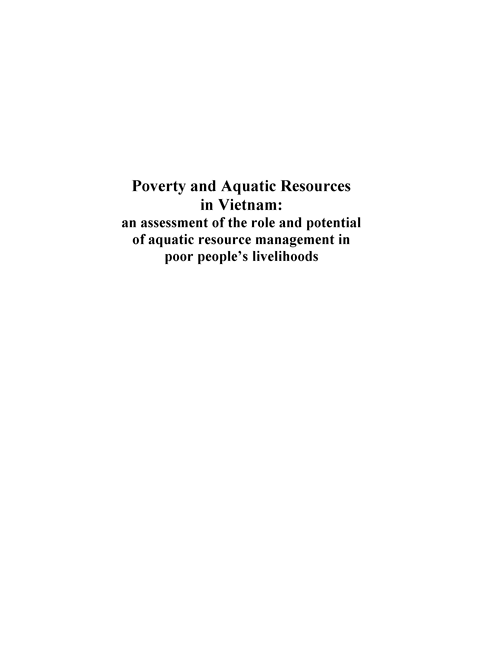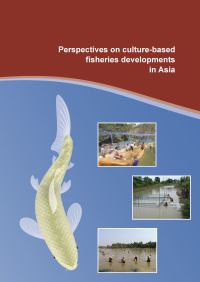Poverty and aquatic resources in Vietnam: An assessment of the role and potential of aquatic resource management in poor people's livelihoods
30 January 2004 | 1401 Downloads | .pdf | 206.95 KB | Food Security, Safety and Certification, Gender, Livelihoods, gender and social issues, Vietnam
A scoping Meeting on “Sustainable Aquaculture for Poverty Alleviation” (SAPA) was held in Hanoi from the 23rd-25th May 2000. The meeting was held to review the role of aquaculture development (in freshwater, brackish water and marine environments) in poverty alleviation and hunger eradication in Vietnam, to identify strategies for the more effective application of aquaculture and aquatic resources management to poverty alleviation, to review a draft framework for a programme on sustainable aquaculture for poverty alleviation (SAPA) and to prepare an appropriate action plan to follow on from the meeting.
The meeting was attended by 100 representatives from MoFI, Ministry of Planning and Investment (MPI), MOLISA, Ministry of Agriculture and Rural Development (MARD), as well as provincial government agencies, people’s organisations international organisations and donors including NORAD who provided most of the funding for the meeting, DANIDA, ACIAR, UNDP and FAO. DFID played a key role in planning and facilitating the meeting.
The meeting identified key issues, including: the need to build a poverty-oriented approach to policy involving better understanding of livelihood goals of poor people as a basis for identifying aquaculture interventions; the poor technical knowledge-base amongst practitioners, weak capacity among institutions at all levels, poor infrastructure and the importance of cooperation among agencies involved in implementing and supporting poverty alleviation through aquaculture (SAPA Scoping Meeting Proceedings, 2000).
Leading on from the meeting and based on its recommendations an action plan was proposed. This included: to report and publish the ‘scoping meeting’; to analyse existing information on poverty and aquatic resources in Vietnam to identify key areas where there are significant numbers of poor people whose livelihoods benefit or could benefit from aquatic resource use (this report), (as the basis for selecting sites for livelihood analyses and more broadly to inform the development of the SAPA strategy); to conduct livelihood analyses with poor people who benefit from aquatic resources in a number of inland and coastal areas to provide a better understanding of different social and environmental contexts; and to prepare with the Ministry of Fisheries a “strategy” paper for submission to the Prime Ministers office in September prior to budget planning for poverty alleviation by MPI.
The strategy paper would provide a clear synthesis of the rationale for a fisheries policy focus on poverty alleviation, a detailed description of the participatory process and principles to be followed for implementation, and an action plan to implement the strategy informed by on-going analyses. Institutional arrangements and potential partnerships including between different projects/donors would also be included as well as requirements for MoFI to co-operate closely with MOLISA, VWU & MARD.
Provisional agreement was reached at the scoping meeting between NORAD, DANIDA, ACIAR, DFID and UNDP to collaborate and share resourcing of activities with MoFI over the next months, with the details to be planned with MoFI. DFID commissioned and coordinated with local specialists this report and DFID ARMP manager was invited by the MoFI to join an 8-person Task Force, under the overall direction of the Vice-Minister, to assist the MoFI in preparing the SAPA strategy framework (including MOFI, Research Institute for Aquaculture 1 (RIA-1), AIT Outreach (SIDA), NACA, NORAD). A Task Force Resource Group comprising 12-14 members from different agencies and organisations supported the Task Force (including MoFI, MOLISA, MARD, RIA-1, DANIDA, FAO, NORAD, ACIAR).
Creative Commons Attribution.

